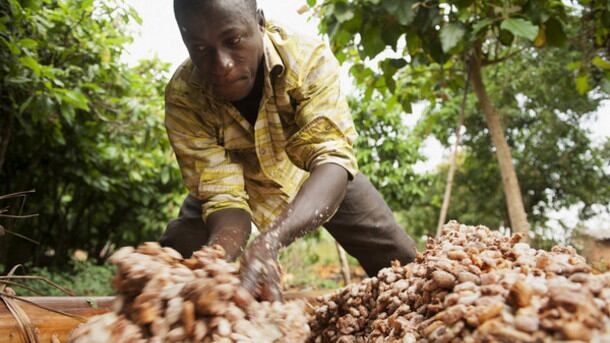Next year, the European Committee for Standardization (CEN) and the International Organization for Standardization (ISO) will create a joint standard for traceable and sustainable cocoa.
This will provide all companies in the chocolate supply chain – not only manufacturers – a reference to ensure their entire supply is compliant.
It is a sign of real progress that no major player in the supply chain should ignore.
Over 80% of cocoa unaccounted for
Cocoa processors argue that the onus falls on branded manufacturers to publicly commit to certified or sustainable cocoa. Many manufacturers are reluctant because they operate in segments or markets where sustainable products have no resonance and say they cannot justify the cost.
How can it be that major manufacturers such as Hershey, Ferrero and Mars and even a smaller cocoa ingredients company, Natra, have committed to 100% certified cocoa by 2020, but the two major suppliers of cocoa and chocolate ingredients have not taken all possible measures to guard against poverty-scale pay, gender inequality and unlawful child labor for over 80% of their supply?
13% of Barry Callebaut’s cocoa and 15-20% of Cargill’s supply comes from a certified farm (eg. UTZ, Fairtrade, Rainforest Alliance) or from one of their own sustainability programs. This leaves the overwhelming majority unaccounted for. The same can be said for cocoa sourced by Nestlé and Mondelez.
It doesn’t mean that the unaccounted portion has been produced by a trafficked child, only that the companies could have done more to ensure it wasn’t.

Customers may demand more from suppliers
All these firms have made multimillion commitments in their own sustainable sourcing programs, which their marketing campaigns claim provides improved livelihoods for farmers.
Cocoa and chocolate companies know how to improve farmer income, they know how to limit unlawful child labor and how to advance opportunities for female cocoa farmers – they communicate the vagaries in Cocoa ‘Promises’, Horizons’ and ‘Life’ programs. Why should those benefits be limited to the fortunate few?
Cocoa promises under Harkin-Engel Protocol

The chocolate industry lobbied against a 2001 US bill that would have required US manufacturers to ensure imported cocoa was ‘slave free’. A voluntary system was adopted instead. Major chocolate manufacturers signed the 2001 Harkin-Engel Protocol, which promised that the industry would develop and implement measures to eliminate the worst forms of child labor on cocoa farms by July 2005. By 2010, it was acknowledged that the Harkin-Engel Protocol hadn’t gone to plan and a new framework was drawn up to reduce the worst forms of child labor by 70% by 2020 instead. Barry Callebaut, Cargill, Nestlé and Mondelez are all signatories.
Social responsibility and regulatory pressures
Nestlé and Mondelez coy on 100% public commitment
The only two major companies that have refused to make a global pledge to source only certified cocoa are strongest in emerging markets, where sustainability doesn’t yet have the resonance it does in developed markets. Nestlé’s largest chocolate market is Brazil, while Mondelez’s priority chocolate markets are India, Brazil and Russia. Nestlé has committed to 100% certified cocoa in the US, but not globally.
Suppliers are closer to the farmer than consumer brands and the top firms have greater financial muscle than many of their smaller customers. The entire supply chain, particularly consumers, should bear the cost, but the top suppliers have the greatest social responsibility.
Just because some consumers and manufacturers are prepared to buy cocoa and chocolate that isn’t certified as sustainable, doesn’t make it alright to supply it. This commercial practice may eventually affect business as socially conscious customers move away from suppliers that can’t guarantee they’ve done everything to prevent labor abuses. For environmental reasons, some confectionery firms already have codes of conduct for palm oil suppliers and the same may eventually be expected of cocoa processors.
Pressure may also come from regulators. In 2010, the Dutch government committed to ensuring all chocolate products produced for the domestic market would be fully sustainable by 2025. It says around 20% of cocoa processed in the Netherlands is currently sustainable.
Vulnerable to legal action
Chocolate and cocoa are already being accused of enabling slavery and unlawful child labor. Nestlé, Cargill and ADM Cocoa are currently contesting a US lawsuit that alleges the firms aided and abetted child slavery in Côte D’Ivoire. The case has been brought by three Malian men who were allegedly trafficked into Côte D’Ivoire as children and forced to work on cocoa farms.
Hershey is also facing a US lawsuit for alleged complicity in illegal child labor in West Africa.
ISO/CEN’s sustainable cocoa definition is likely to change. But there’s no reason companies can’t set targets to fully comply with the original meaning and to later alter sourcing practices to ensure compliance with the evolving standard.
Certification is not guaranteed to bring a farmer out of poverty and it’s questionable whether the CEN/ISO will either. But it’s a giant leap towards this aim if all parties - suppliers, manufacturers and retailers - align and commit to eventually sourcing 100% sustainable cocoa to a common definition.
